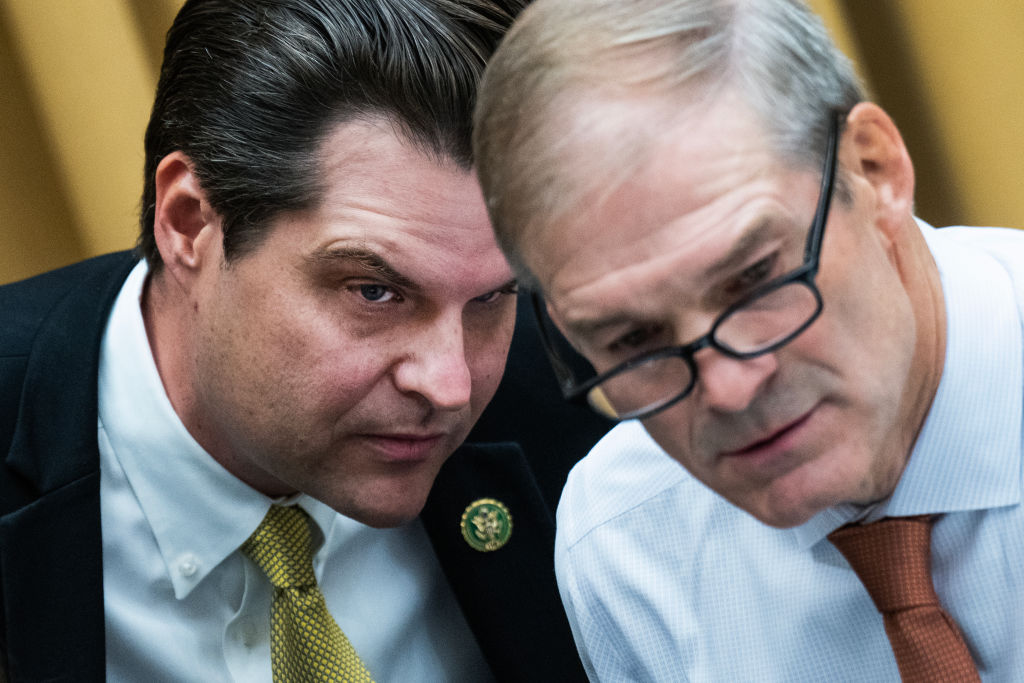Americans are fed up with what is now literally a do-nothing Congress. Sixty-seven percent of respondents in a new poll taken before the latest maneuvers by House Republicans said that the chamber needs to elect a speaker “as soon as possible.”
And that’s with the shady prompt in one question of the poll by Suffolk University for USA Today: “I don’t care if Congress elects a speaker. Every day that goes by without a speaker means that Congress can’t waste more of our tax dollars.” Not only is that misleading, since government waste continues and, in theory, could be even worse without congressional oversight, but it’s also a prompt that is basically trolling for conservatives.
Even with that crummy wording, the poll could still scrape up only 25 percent of the electorate that wanted a speakerless House.
Yet, in the same poll, 61 percent of respondents expressed very little or no confidence “in the nation’s leaders to handle the major challenges the nation faces.”
The shorter version of the poll: We want leadership, but we don’t think that it will do much good.
Womp, womp.
In 2016, more than 8 million voters—maybe a lot more—who had voted for Barack Obama in the previous presidential election voted for Donald Trump. Looked at one way, this is quite a reversal. To go from one of the youngest presidents to one of the oldest, the first African American president to one in the vein of George Wallace, a progressive to an America First nationalist, a Democrat to a Republican is quite a switch.
But looked at another way, many of these voters, who were clustered in the deindustrialized communities of the Ohio and Mississippi valleys, were voting for the same thing with Trump as they were with Obama: change.
Some of the shift was part of an ongoing realignment of working-class white voters to the Republican Party. But looking at the movement back to Democrats in 2020 in these same areas suggests that the more important force in voter psychology was the desire for something else. In 1992, 2000, and 2008, much the same could have been said. Americans keep looking for the opposite kind of leaders to the ones they have, rebooting their computers in hopes that the bugs will get worked out along the way.
It’s understandable they would think this way. What do you do when your baseball team has a losing record or your company racks up losses? You fire the manager. Get some new blood in there and shake things up.
But the government can’t be run like a sports team or a corporation. The government exists not to win, but to serve. And at the center of that mission is to resolve the natural conflicts between Americans who are seeking advantages for themselves and their groups. We have a government not to avoid internal conflicts, but to resolve them in the most efficient, least injurious ways. Then, once those conflicts are resolved, the government is supposed to administer the agreed-upon policies.
Who should be allowed to drive a car on public roads? A representative legislature might debate at what age, with what kind of insurance, under what degree of inebriation, and in what type of vehicle that citizens might be allowed to drive. Then it falls to the state to provide services, like granting licenses and registration, and use police power to see that the rules are uniformly followed.
Winning, in this case, looks like citizens coming and going as they please under rules established by the popularly elected legislature and enforced by the representatives of the elected executive. You could elect legislators who wanted to raise the minimum driving age to 18, or vote against a governor or mayor who was lax or uneven in enforcing the rules. But what you want as a citizen is clear, predictable, impartial, competent administration.
We can understand that on the local level, and do it all the time with the DMV, school systems, trash collection, and other public services. We care less about the attributes or partisanship of the individuals making and enforcing the rules and more about whether the job gets done.
So what happens when our national politics get disconnected from the basic purpose of government? When, in an increasingly irreligious population, politics takes on the garments of faith and cultural identity more than the humbler garb of competent administration? When the surest path to political power is to attack politics itself?
You’d have what we’re living through today. You’d have a political system in which failure begets radicalism and radicalism begets more failure still.
So it is not surprising that voters would lurch between extremes. First, thanks to our screwy primary system, that’s about all the parties can manage to put on offer. But it’s also because when we elect people who were sent there to tear things down, conflicts go unaddressed and fester. And fed-up voters become increasingly susceptible to the ministrations of demagogues and authoritarians.
That’s why it matters far less whom the members of the House choose as the next speaker than the rules under which that speaker and the body over which she or he presides will operate. You could make Abe Lincoln speaker of the House and he would fail with the wrong rules. Or you could, as American history richly illustrates, have a second-rate talent or a dolt who did just fine with the right rules in place.
House Republicans continually swapping out leaders while failing to advance the policies of the voters who elected them is a pretty tight analogy for American politics as a whole this century. The car is rusting out through the floorboards and the engine is seized up, but we’re debating who gets to drive.
For two decades, control of Congress has passed back and forth with neither party able to develop any kind of real governing majority. There are many reasons for this, including our well-sorted, highly partisan, evenly divided electorate and the arbitrarily small size of our House of Representatives. But it is also because the rules of the institution itself are arranged more for elections than governance.
Partisan leaders in Congress are not typically chosen because of their legislative prowess, but rather for their capacity to raise money and protect incumbents from unpleasant votes. The skills sought are not in getting things accomplished, but in charting a course that avoids accomplishment on issues that might upset either primary voters or the handful of persuadable voters in the general electorate. Which is to say, pretty much everything.
Until the House returns to regular order so that committees can do their work and legislation can be hashed out—even when it will make some incumbents vulnerable, even when it will cut against election-year “messaging”—it won’t matter who the speaker of the House is or isn’t.
Switching presidents or switching speakers can’t change outcomes until Americans get to work on fixing the institutions those people lead. For the House, that means getting back to rules that allow the body to function. Just like you’d want at the DMV: Clear, predictable, impartial, competent administration.







Please note that we at The Dispatch hold ourselves, our work, and our commenters to a higher standard than other places on the internet. We welcome comments that foster genuine debate or discussion—including comments critical of us or our work—but responses that include ad hominem attacks on fellow Dispatch members or are intended to stoke fear and anger may be moderated.
With your membership, you only have the ability to comment on The Morning Dispatch articles. Consider upgrading to join the conversation everywhere.